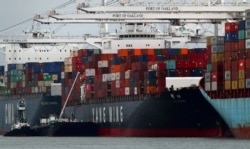Report updated Aug. 13, 2019, 9:30 p.m.
WASHINGTON - The United States is delaying a new 10% tariff on some key Chinese imports which was supposed to take effect Sept. 1.
The Office of the U.S. Trade Representative said the levies on laptop computers and computer monitors, cellphones, video game consoles, some toys, shoes and clothing will be put off until Dec. 15. The postponement could help U.S. consumers, who often buy such items as Christmas presents.
"What we’ve done is, we’ve delayed it so they won’t be relevant in the Christmas shopping season just in case they might have an impact on people,” President Donald Trump said Tuesday.
The U.S is also exempting tariffs altogether on a separate group of Chinese imports "based on health, safety, national security and other factors."
But the new tariff will still be imposed on a wide range of other Chinese goods, the U.S. trade office said, with the list of affected products to be announced soon.
After days of losses, U.S. stock indexes surged on news of the tariff rollbacks. Markets in New York jumped 1.5% or more.
Trump contended Tuesday that tariffs he has already imposed on hundreds of billions of dollars of Chinese goods are benefiting the U.S. Treasury. He said the tariffs are not hurting U.S. consumers or farmers whose produce China has stopped buying.
"Through massive devaluation of their currency and pumping vast sums of money into their system, the tens of billions of dollars that the U.S. is receiving is a gift from China," Trump tweeted. "Prices not up, no inflation. Farmers getting more than China would be spending. Fake News won’t report!"
He added, "As usual, China said they were going to be buying 'big' from our great American Farmers. So far they have not done what they said. Maybe this will be different!"
Over a two-year period, Trump has sent or promised to pay U.S. farmers more than $26 billion in government aid to compensate them for losses they have sustained since China stopped buying American grains and other products.
Despite Trump's claim, it is U.S. importers who pay tariffs, not exporters like China, and the American corporations often include the cost of the levies in the price of the goods they sell to other businesses and consumers.
Trade negotiations between the U.S. and China, the world's two largest economies, have been contentious, with Washington and Beijing unable to reach an agreement.
The next round of trade talks between are expected to occur in September after the U.S. tariffs take effect.
Later at a speech north of Pittsburgh Tuesday, Trump fired criticism at another of his top targets -- the World Trade Organization.
"We will leave it if we have to. We know that they have been screwing us for years and it’s not going to happen again," Trump said.
He said he is upset at what he sees as relatively wealthy countries, including China, getting preferential treatment by the WTO, which still regards them as emerging economies.
The White House has named a number of countries it says exempt themselves from WTO rules, including Mexico, Kuwait, South Korea and Turkey.
Administration officials want the WTO to reform the way it considers which countries are developing economies and eligible for preferential treatment.
Trump said when rich nations claim developing nation status, it harms genuine developing economies and is unfair to the U.S., which the White House said plays by WTO rules.







